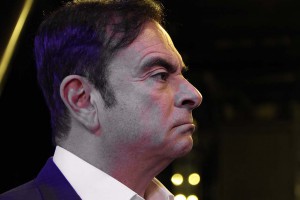
Carlos Ghosn was taken into custody again in Japan after new charges were filed against him by prosecutors.
Carlos Ghosn, the former Nissan boss who was rearrested for the fourth time on Thursday on charges of financial corruption will be detained at the Tokyo Detention Center until at least April 14, a court in the capital city ruled Friday morning.
As they did when Ghosn was first arrested Nov. 19, prosecutors can readily seek a 10-day extension and they have already proved adept at stringing things out even longer, Ghosn spending a total of 108 days in solitary confinement before finally winning bail on March 6. Among other things, authorities could arrest Ghosn for a fifth time on new or revised charges.
Prosecutors based the latest arrest on allegations that $5 million a Nissan subsidiary had intended for a dealership in Oman was instead diverted to a company controlled by Ghosn. Prior arrests have outlined claims that the executive, among other things, hid nearly $90 million in income.
The 65-year-old executive, who had served as the head of all three members of the Renault-Nissan-Mitsubishi Alliance prior to his November downfall, declared “My arrest this morning is outrageous and arbitrary,” in a statement issued after he was roused from his apartment in Tokyo.
Ghosn won bail last month only after posting 1 billion yen, or $8.9 million and agreeing to a series of strict rules that, among other things, limit his movements. Nissan no longer provides the lavish home that had been his before being fired as CEO in November, meaning Ghosn had to rent a new apartment.
(Former Nissan CEO Ghosn rearrested on new corruption charges. Click Here for the story.)
Authorities told the court that the Brazilian-born executive needed to again be held in custody to prevent him from tampering with evidence, a claim disputed by Ghosn’s attorney, Junichiro Hironaka. The attorney has a history of winning high-profile acquittals in a country that claims a conviction rate of more than 90%.
Hironaka is among the rare few within a very homogeneous Japanese society to routinely criticize the country’s judicial system. In a March conversation with reporters at the Foreign Correspondents Club in Tokyo, Hironaka called it “hostage justice.”
During his latest detention, in fact, Ghosn will face daily interrogations without the presence of counsel. During his first stay behind bars he was also pressured repeatedly to sign a confession written in Japanese, a language he does not speak.
A similar process was used to eventually win a conviction with an American auto executive, former Toyota chief global PR manager Julie Hamp, two years ago. She was released and banned from returning to Japan.
The timing of Ghosn’s latest arrest, his attorney noted, came barely a week before the always outspoken executive planned to hold a news conference, Hironaka said, to reveal “the truth about what was happening.”
(Click Here to see how “plot and treason” brought Ghosn down, jailed exec says.)
Ghosn has claimed that he is the victim of “a coup,” and a number of sources close to the former executive, Nissan and the Alliance have raised questions about why the case was initiated.
But the latest charges broaden the range of charges facing Ghosn, alleging he illegally diverted company funds, rather than just failing to report income, as the original November arrest was based on.
Several of those sources say Ghosn is making things difficult both for Nissan and for prosecutors by speaking out, something rarely done by Japanese criminal defendants.
“I will not be broken. I am innocent of the groundless charges and accusations against me,” he declared in his Thursday statement.
The latest charges could see Ghosn jailed for 15 years. By accepting a plea deal that would have him acknowledge guilt, however, there has been speculation that authorities would accept the time he has served and then boot the one-time high-flying executive out of the country.
(For our coverage of Ghosn’s first court appearance, Click Here.)
Instead, Ghosn may yet force a trial that could result in disclosures uncomfortable for Nissan and Japanese authorities, even if he risks a long prison term.
